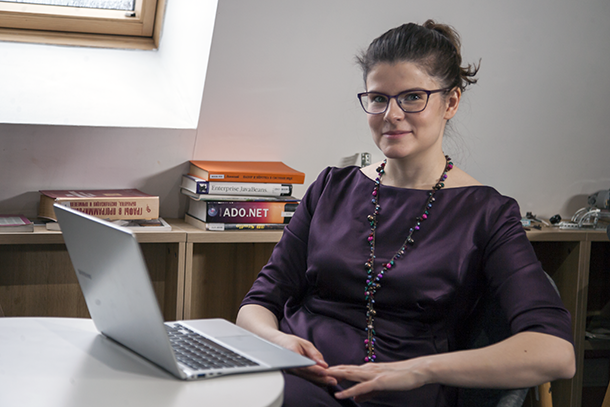Meet Mikhail Vink, Global Marketing Programs Manager at JetBrains
Background: Having joined JetBrains in 2012 as a Product Marketing Manager (PMM) for PhpStorm, Mikhail (Misha) Vink is now focused on refining and optimizing our marketing processes. Graduated from the Saint Petersburg Electrotechnical University (LETI) majoring in Computer Security. Former owner of a web development studio.
(I’m interviewing Misha on Skype as I’m based in St. Petersburg, Russia, while he’s in Munich, Germany.)

Hi Misha! Let’s start with the times before you joined JetBrains. Most of our colleagues have an interesting story of how they ended up here. Can you share yours?
Sure, I hope mine makes for a story. You know many JetBrainers follow the same general path: they attend 239 (the renowned Presidential Physics and Mathematics Lyceum No. 239) and then go on to study at ‘Math&Mech’ (the Faculty of Mathematics and Mechanics of the St. Petersburg State University). When I joined JetBrains and my profile appeared in the company network, people thought it was my brother. They knew him from both 239 and then Math&Mech, so they assumed I was him. But I was me. I went to a regular high school and then the Saint Petersburg Electrotechnical University. And yet I’m here now.

How did it all happen? I guess that means revisiting your university years.
Even earlier than that. I got my first job in 7th grade, substituting for the administrative assistant at my dad’s computer firm. Later I looked for other jobs but couldn’t get hired except as an Oriflame sales agent. I’d heard that guys working for them would often get beaten up on the job, and I definitely wasn’t up for that. At some point I developed an online store for my dad, in exchange for a laptop. I realized I could do that for a living. I sent out my résumé to 30 different places, did a test for one and got hired as a junior PHP developer. I worked for them remotely for a year and a half and then turned freelance. That offered more opportunities. Later I turned my freelance business into my first company.
Your first one? Have there been others?
Yeah, I’ve had three, each one involved with development in one way or another. The first one eventually transitioned into my third, which focused on developing software and web services and on consulting. My second company was set up specifically for a project we worked on, which had to do with developing ad automation systems. By the time that was over, my company occupied several good niches that were connected with the real sector, mainly IT solutions for auto part sales.
Many people dislike 9 to 5 jobs and dream of starting their own business. How did you end up abandoning your startups to work for someone else?
I got bored developing services because all our projects and customers were basically the same, nothing was changing. But, I had no fresh ideas for my own product or a product-making business, as opposed to a service-based one. At some point I met the GameChangers founder Sergey Dmitriev (not to be confused with his namesake who founded JetBrains and is its current president.) Sergey told me GameChangers was the right place for me. (GameChangers offers free one-year programs for ad-hoc education and research in IT & business.) I didn’t understand what he meant but decided to give it a shot, and they admitted me. That’s when I got interested in how an IT product-making business operates and things like that. I sold my firms and went to word for an innovative company instead.
Do your firms still exist today?
Like I said, my first one transitioned into the third one, which I co-owned with a partner. After I sold it the new owners integrated and merged it into their own processes. The second one was created to complete a specific project, so once it was done we closed shop. As I was selling my third firm, a few things happened that further convinced me I didn’t really want to have my own business.
I understand you went through a hectic period then. What advice would you give people who want to do business in Russia?
Do your homework and research. Know how to keep yourself and your business safe when it reaches a certain size.
You came to JetBrains as a PMM (Product Marketing Manager). Why not as a developer?
I’m not on the level of JetBrains developers so that wasn’t an option.
Is it difficult for you to work with developers?
No, it’s easy because it’s pretty close to my background.
What was your biggest challenge during your first year at JetBrains?
Learning to wait. Not everything that I want done can be done quickly. In addition to product development teams we have other internal departments, like designers, researchers, Internet marketing and so on. Every department and colleague has their priorities, and things I need done aren’t always prioritized. This is absolutely normal for a large company, but coming from a small business owner I had to get used to it.
You worked as a PMM for several years. What is the key thing about this job? Everyone defines it differently, so I’m interested to get your take on it.
A PMM must think about the business side of the product. They need to serve as a user advocate inside the company and the product development team.
Does that mean you interacted with users a lot?
Yes, that was part of my routine. Community outreach was instrumental in helping us enter certain markets.
PhpStorm is designed for PHP developers. How would you describe the specifics of this market?
For PhpStorm and WebStorm, the target audience has a low threshold for working with the main programming language that the IDE supports. The learning curve for these languages is much easier than that for Java or С#. This raises our company’s responsibility for educating our users to use our tools. Simply put, beginners are often unaware of many things. PhpStorm seems over-the-top for them, so we must work harder to teach our users to take advantage of its power so they can really start enjoying it.
About a year ago you passed the PhpStorm PMM role to Anna Lebedeva and moved on to other things. What are you working on now?
I work on a few very diverse projects. The first one has to do with different activities around the JetBrains plugin ecosystem and the plugin repository. The second is about adapting our marketing strategies and sales activities to new emerging markets, some of which require new approaches. The third is related to technical integrations and automations in customer support.
Can you give me an example of a market like that?
Well, the Asian market is very culture-specific. English fluency is low (see some statistics here), so localization is key. Just recently we came back from a long business trip in Asia where all our talks were interpreted. Asian companies prefer to buy from local distributors, so resellers have a big influence on what products customer end up choosing. Also, if we talk about China, piracy is rampant.
In your opinion, what is the most important event in the software development industry over the last couple of years?
I wouldn’t single out any one event, as things tend to evolve gradually. Technologies are more the result of evolution than revolution. Even if a new technology springs up, it takes time to develop something real based on it, and it’s not always possible to showcase it on a successful live product. Take for example the recent shift towards cloud services. The IoT (Internet of Things) is trending. There are so many devices out now, and the latest series of hacks has shown how vulnerable this area is. This booming market has attracted traditional manufacturers who are not experts in IT security. Data leaks are happening all the time. But still, none of this is quite revolutionary.
How will the development market be changing in the next five years?
I can only speculate about that. To me it doesn’t feel like the development market is changing all that quickly. If we take IDEs, JetBrains has already turned 17 and increasingly more often we’re hearing predictions that the development market will move to the cloud. GitHub is a case in point, as are other server-based and team collaboration tools. People keep saying IDEs are bound to die out. But there’s still no sign of that happening. In the next five years, I don’t expect any drastic changes in the way developers do their jobs. Things will continue to move to the cloud; classical desktop-based IDEs will get increased competition from in-cloud IDEs. New languages such as Kotlin will emerge. Still, Kotlin is the result of an evolution; it first appeared several years ago and keeps getting better with every version.
IT media and social networks in general are excited by recent AI advances. They say robots will replace humans not only at supermarket checkouts but in intellectual professions as well. Do you think this may apply to software developers too?
The onset of robots and AI is unlikely to drastically change the software development market. AI has dominated last year’s trends, but the underlying technologies are decades old. It’s just that the computing power has recently gone up to make these technologies viable in many more areas. Robots have been around for a while, replacing quite a few things. They did some research in Germany about automatizing clerk jobs and came to the conclusion that about 51% of jobs could be automatized, but what for? What would the society do with all those people? Guaranteed minimal income looks interesting. They’re not doing it in Switzerland after all, but still testing in Finland and debating in the US. Perhaps some societies are approaching guaranteed minimum income, but markets that enjoy cheap labor will continue to use humans.
I guess we’re drifting off into sociology and philosophy and away from IT. But maybe it’s not bad for people to keep working?
If we talk about countries where people labor is exploited and abused, especially child labor, then I would hardly think so. That’s not in the case in developed countries, where the concept of minimal income implies that most people would continue to work, but would be guaranteed a minimum standard of living. This would supposedly motivate them to seek better jobs without fear of not having enough money to pay rent or put food on the table. Happier and more productive workers are just better for the economy.
When you realize these changes are going to happen in your lifetime, it may feel too close for comfort… but still be pretty exciting. The evolution of the labor market – and the unemployment market – will lead to major changes in other areas, including education. Recently I listened to Esther Wojcicki, a professor from San Jose, talk about an alternative education model. In this model, you don’t tell students what to do, but give them a scope and they figure things out on their own, in practice. The whole paradigm of how children and adults are educated will soon shift. This is already taking place and scaling up. When I was preparing to relocate to Munich, I thought about doing something like what GameChangers are doing – they attract some really awesome experts. Now in Munich I attend lectures at CDTM, which is similar to GameChangers. Their programs are aimed to bridge the gap in knowledge and skills that graduates necessarily have compared to experienced industry professionals. And they’ve had such programs at universities since 1998.
Since we’re talking about being expert at things, what skills would you single out as your strongest in working for JetBrains?
First, I’m organized and I structure everything I do. I write a lot. I like to write everything out so it’s all neat and structured in my head. This also lets me look back later and evaluate my decision-making and learn from that.
Second, it’s my love of numbers. Not that I’m very good at math, but I like to work numbers myself. You and I have talked before about how it’s easier for me to calculate things first so that you (the JetBrains Research team) can verify my calculations and build your forecasts accordingly. This saved us lots of time, because I couldn’t and didn’t expect you to dig that deep into the world of PHP development and my product’s specifics, not as deep as I did myself. So I formed hypotheses, calculated them, brought them to you, we verified them, and this method just worked so quickly.
What motivates you?
I’m driven by internal motivation factors, the biggest of which boredom. I get bored, I go find something new to do. My interviewer, Natalie Chisler, asked me what I would do once I got bored. Well, I’m happy to have many projects to switch between, so I don’t expect to get bored any time soon. Plus I like doing things that benefit other people. I guess I’m not big on external motivation. Some people need positive feedback all the time, but not me.
If you could go back to your university years, would you change your focus?
I would do the same. As I said in the beginning, many of our colleagues are here because of the high school and university they went to. I took a different path. If I had gone to Math&Mech, I wouldn’t have become an entrepreneur. First, I’d get kicked out for bad attendance. Second, since it’s located way out in Peterhof (40 minutes away from the closest subway station in St. Petersburg), I wouldn’t be able to schedule a lot of business meetings downtown. So I like how it all worked out for me.

Maria Antropova,
JetBrains Research team lead




